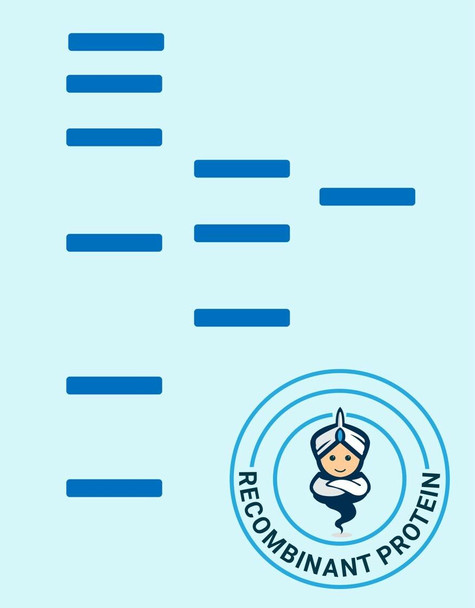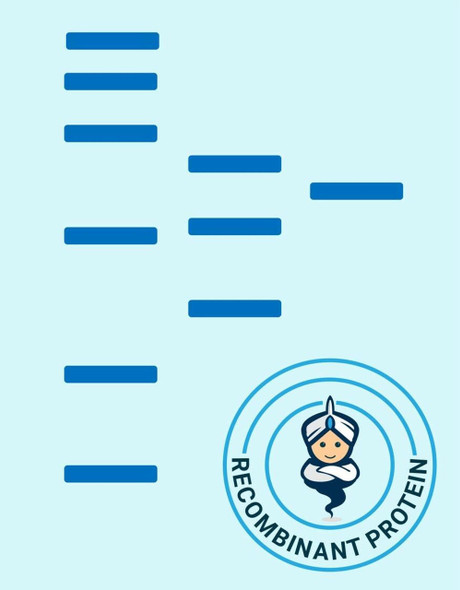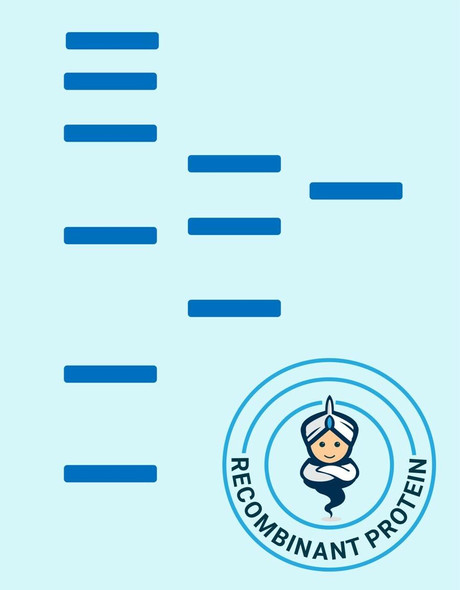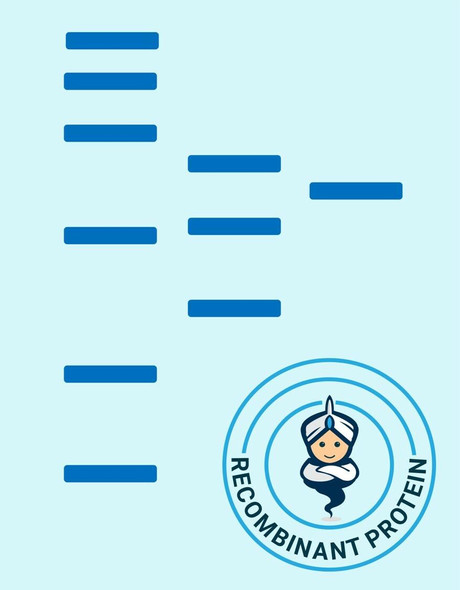Description
| Product Name: | Human HADH Recombinant Protein |
| Product Code: | RPPB1790 |
| Size: | 25µg |
| Species: | Human |
| Target: | HADH |
| Synonyms: | EC 1.1.1.35, HAD, HADH1, HHF4, MSCHAD, SCHAD, Hydroxyacyl-coenzyme A dehydrogenase, HCDH, Short-chain 3-hydroxyacyl-CoA dehydrogenase, Medium and short-chain L-3-hydroxyacyl-coenzyme A dehydrogenase, HADH, HADHSC, MGC8392. |
| Source: | Escherichia Coli |
| Physical Appearance: | Sterile Filtered clear colorless solution. |
| Formulation: | The HADH solution contains 20mM Tris-HCl pH-8, 0.1M NaCl and 20% glycerol. |
| Stability: | Store at 4°C if entire vial will be used within 2-4 weeks. Store, frozen at -20°C for longer periods of time. For long term storage it is recommended to add a carrier protein (0.1% HSA or BSA).Avoid multiple freeze-thaw cycles. |
| Purity: | Greater than 95% as determined by SDS-PAGE. |
| Amino Acid Sequence: | MGSSHHHHHH SSGLVPRGSH MSSSSTASAS AKKIIVKHVT VIGGGLMGAG IAQVAAATGH TVVLVDQTED ILAKSKKGIE ESLRKVAKKK FAENPKAGDE FVEKTLSTIA TSTDAASVVH STDLVVEAIV ENLKVKNELF KRLDKFAAEH TIFASNTSSL QITSIANATT RQDRFAGLHF FNPVPVMKLV EVIKTPMTSQ KTFESLVDFS KALGKHPVSC KDTPGFIVNR LLVPYLMEAI RLYERGDASK EDIDTAMKLG AGYPMGPFEL LDYVGLDTTK FIVDGWHEMD AENPLHQPSP SLNKLVAENK FGKKTGEGFY KYK |
HADH is part of the 3-hydroxyacyl-CoA dehydrogenase enzyme family. HADH is involved in mitochondrial matrix to catalyze the oxidation of straight-chain 3-hydroxyacyl-CoAs as part of the beta-oxidation pathway. HADH enzymatic activity is at its peak with medium-chain-length fatty acids. Mutations in HADH cause familial hyperinsulinemic hypoglycemia. HADH participates in fatty acid oxidation, where some enzymes work in a step-wise fashion to break metabolize fats and convert them to energy.
HADH Human Recombinant fused to a 21 amino acids His Tag at N-terminal produced in E.Coli is a single, non-glycosylated, polypeptide chain containing 323 amino acids (13-314 a.a.) and having a molecular mass of 35.1 kDa. The HADH is purified by proprietary chromatographic techniques.
| UniProt Protein Function: | HADHSC: Plays an essential role in the mitochondrial beta- oxidation of short chain fatty acids. Exerts it highest activity toward 3-hydroxybutyryl-CoA. Defects in HADH are the cause of 3-alpha-hydroxyacyl-CoA dehydrogenase deficiency (HADH deficiency). HADH deficiency is a metabolic disorder with various clinical presentations including hypoglycemia, hepatoencephalopathy, myopathy or cardiomyopathy, and in some cases sudden death. Defects in HADH are the cause of familial hyperinsulinemic hypoglycemia type 4 (HHF4); also known as persistent hyperinsulinemic hypoglycemia of infancy (PHHI) or congenital hyperinsulinism. HHF is the most common cause of persistent hypoglycemia in infancy and is due to defective negative feedback regulation of insulin secretion by low glucose levels. It causes nesidioblastosis, a diffuse abnormality of the pancreas in which there is extensive, often disorganized formation of new islets. Unless early and aggressive intervention is undertaken, brain damage from recurrent episodes of hypoglycemia may occur. HHF4 should be easily recognizable by analysis of acylcarnitine species and that this disorder responds well to treatment with diazoxide. It provides the first 'experiment of nature' that links impaired fatty acid oxidation to hyperinsulinism and that provides support for the concept that a lipid signaling pathway is implicated in the control of insulin secretion. Belongs to the 3-hydroxyacyl-CoA dehydrogenase family. 2 isoforms of the human protein are produced by alternative splicing. |
| UniProt Protein Details: | Protein type:Lipid Metabolism - fatty acid elongation in mitochondria; Oxidoreductase; Amino Acid Metabolism - tryptophan; Amino Acid Metabolism - lysine degradation; Carbohydrate Metabolism - butanoate; EC 1.1.1.35; Lipid Metabolism - fatty acid; Amino Acid Metabolism - valine, leucine and isoleucine degradation Chromosomal Location of Human Ortholog: 4q22-q26 Cellular Component: nucleoplasm; mitochondrion; mitochondrial matrix; cytoplasm; mitochondrial inner membrane Molecular Function:3-hydroxyacyl-CoA dehydrogenase activity Biological Process: response to drug; fatty acid beta-oxidation; cellular lipid metabolic process; response to activity; response to insulin stimulus; negative regulation of insulin secretion Disease: 3-hydroxyacyl-coa Dehydrogenase Deficiency; Hyperinsulinemic Hypoglycemia, Familial, 4 |
| NCBI Summary: | This gene is a member of the 3-hydroxyacyl-CoA dehydrogenase gene family. The encoded protein functions in the mitochondrial matrix to catalyze the oxidation of straight-chain 3-hydroxyacyl-CoAs as part of the beta-oxidation pathway. Its enzymatic activity is highest with medium-chain-length fatty acids. Mutations in this gene cause one form of familial hyperinsulinemic hypoglycemia. The human genome contains a related pseudogene of this gene on chromosome 15. [provided by RefSeq, May 2010] |
| UniProt Code: | Q16836 |
| NCBI GenInfo Identifier: | 311033442 |
| NCBI Gene ID: | 3033 |
| NCBI Accession: | Q16836.3 |
| UniProt Secondary Accession: | Q16836,O00324, O00397, O00753, Q4W5B4, J3KQ17, |
| UniProt Related Accession: | Q16836 |
| Molecular Weight: | 314 |
| NCBI Full Name: | Hydroxyacyl-coenzyme A dehydrogenase, mitochondrial |
| NCBI Synonym Full Names: | hydroxyacyl-CoA dehydrogenase |
| NCBI Official Symbol: | HADH�� |
| NCBI Official Synonym Symbols: | HAD; HCDH; HHF4; HADH1; SCHAD; HADHSC; MSCHAD�� |
| NCBI Protein Information: | hydroxyacyl-coenzyme A dehydrogenase, mitochondrial; short-chain 3-hydroxyacyl-CoA dehydrogenase; L-3-hydroxyacyl-Coenzyme A dehydrogenase, short chain; medium and short-chain L-3-hydroxyacyl-coenzyme A dehydrogenase |
| UniProt Protein Name: | Hydroxyacyl-coenzyme A dehydrogenase, mitochondrial |
| UniProt Synonym Protein Names: | Medium and short-chain L-3-hydroxyacyl-coenzyme A dehydrogenase; Short-chain 3-hydroxyacyl-CoA dehydrogenase |
| Protein Family: | Hydroxyacyl-coenzyme A dehydrogenase |
| UniProt Gene Name: | HADH�� |
| UniProt Entry Name: | HCDH_HUMAN |










